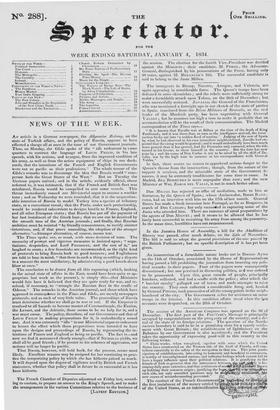NEWS OF THE WEEK.
AN article in a German newspaper, the Allgemeine Zeitung, on the state of Turkish affairs, and the policy of Russia, appears to have effected a change all at once in the tone of our Government journals. Thus, on Monday, the Globe spoke of the "idle endeavour in some quarters to contrast the language of Louis Pump, in his late speech, with his actions, and to argue, from the improved condition of his army, as well as from the active equipment of ships in our dock- yards, that the intentions of the French and English Governments were not so pacific as their professions." The whole tenour of the Globe's remarks was to discourage the idea that Russia would " exas- perate both the Great States of the West." But on Tuesday the German papers arrived ; and in the article, evidently official, above referred to, it was intimated, that if the French and British fleet was reinforced, Russia would be compelled to arm some vessels. This threat immediately caused our Ministerial organ to assume a warlike tone ; and on Wednesday we were reminded, that it is the unquestion- able intention of Russia to model Turkey into a species of tributary state, or a convenient vassal; that the Torte, under such protectorship, would be rendered subservient to designs hostile to France, England, and all other European states ; that Russia bus put off the payment of her last instalment of the Greek loan ; that no one can be deceived by the smooth tone of the Austrian journals ; and finally, that Russian ambition must be resisted "by friendly remonstrance, to rectify sinister 'intentions, and, if that prove unavailing, the adoption of the stronger alternatice."—Stronger alternative, of course, means war.
The Times spoke out, as usual, with inure decision of tone. The necessity of prompt and vigorous measures is insisted upon; "nego- tiations, despatches, and Lord PONSONBY, and the rest of it," are laughed to scorn ; a few broadsides are recommended, as the right kind of protocols to bring Russia back to good manners ; and Fnglishmen are told to bear in mind, "that there is such a thing as settling a dispute in a manner the most satisfactory, by administering a good knock-down blow at once."
The conclusion to be drawn from all this vapouring (which, looking to the actual state of affitirs in the East, would have been quite as ap- propriate last week as the present), is simply this—that Ministers would fain have it believed that they are quite ready for war, and re- solved, if necessary, to "strangle the Russian fleet in the cradle of Odessa." The remarks in the Austrian journal, and those which have appeared in consequince in the Times and Globe, are merely newspaper protocols, and as such of very little value. The proceedings of Russia must determine whether we shall go to war or not. If the Emperor is resolved 'at all hazards to become master of Constantinople, the Euxine, the Levant, and the Adriatic, there seems to be no help for it, and a war must ensue. The policy, therefore, of our Government and that of LOUIS PHILIP in making preparations for it, is undoubtedly a sound one. And it was extremely " idle" in our Ministerial organ to endeavour to lessen the effect which those preparations were intended to have upon the designs and proceedings of Russia, by representing the in- tentions of France and England as being so pacific. The fact is—and now we find it announced clearly enough—that if Nicuosas yields, we shall all be good friends ; if he persist in his schemes of aggression, our actions will no longer be pacific.
That Russia, however, will hold back, for the present, seems most likely. Excellent reasons may be assigned for her continuing to prac- tice the temporizing policy by which she has hitherto gained so much. It will depend upon the degree of vigilance used by British and French statesmen, whether that policy shall in future be as successful as it has been hitherto.






















 Previous page
Previous page